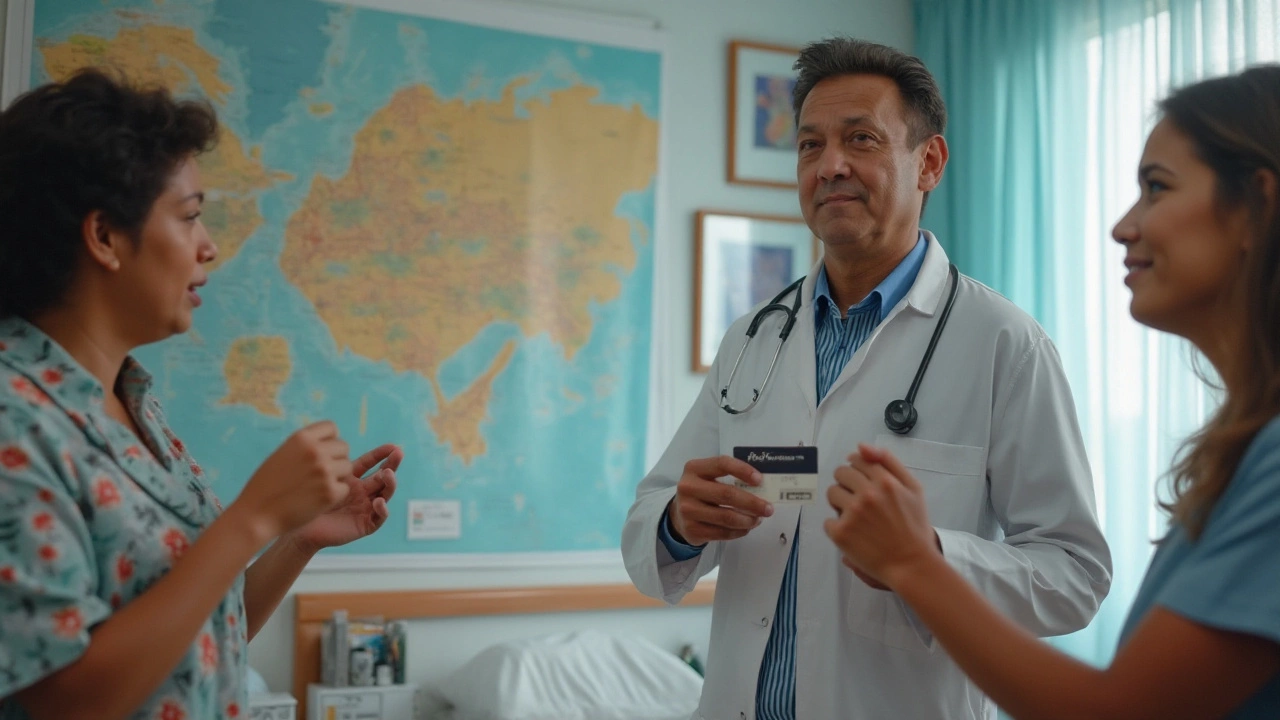
- Dec, 15 2024
- 0
Planning an international getaway involves a checklist of important items: passport, travel insurance, foreign currency. But what about your Medicare card? It's natural to wonder how your healthcare coverage works beyond U.S. borders and whether your trusted red, white, and blue card will protect you during your travels.
Although U.S. Medicare generally won’t cover healthcare expenses outside the country, understanding its role and limitations is crucial for every traveler. Medical emergencies don't pause for vacations, making it essential to know your options.
This guide will decode the enigma of using Medicare overseas, highlight why carrying your card might still be beneficial, and present alternative strategies for safeguarding your health while you explore the wonders of foreign lands. Dive in to ensure that health problems don't cloud your travel memories.
- Understanding Medicare Coverage Outside the U.S.
- Potential Risks When Traveling Without Your Card
- Alternative Healthcare Options Abroad
- Preparing for Health Emergencies Overseas
- Tips for Managing Healthcare Costs While Traveling
Understanding Medicare Coverage Outside the U.S.
Many travelers assume that their Medicare card provides a safety net wherever they go, but this isn't entirely the case when you step outside the U.S. Conventional Medicare coverage, composed of Part A (hospital insurance) and Part B (medical insurance), primarily functions within the American borders and its territories. There are, however, a few exceptional circumstances where Medicare may offer limited benefits internationally, such as during emergencies within the U.S. borders’ vicinity or while on a cruise ship. Unfortunately, these exceptions are rare, and for the most part, Medicare’s power diminishes overseas.
Most people don’t realize this, but even when you’re on a ship in the territorial waters adjoining the U.S., it’s only when the vessel remains close to American boundaries that Medicare might cover you. Ironic as it seems, you could be denied coverage if your ship ventures further into international waters, a fact that catches many by surprise. It’s crucial to understand why your Medicare card becomes less helpful abroad. Essentially, traditional Medicare was designed with a domestic focus, largely attributed to the complexity and variations in international medical billing systems and healthcare regulations worldwide.
According to Medicare.gov, "In most situations, Medicare won't pay for health care or supplies you get outside the U.S., except for some rare cases as described in your coverage provisions."
Given this limitation, travelers need to be proactive in managing their healthcare needs while abroad. Ignoring this detail can lead to unexpected and costly medical expenses. When planning a trip beyond American soil, you should consider additional health protection, such as travel insurance with comprehensive coverage. Supplemental policies often fill in the gaps left by traditional Medicare coverage, providing terms tailored to international settings. A thoughtful approach can include studying specific clauses in diverse travel insurance plans to ensure they align with potential healthcare needs and emergency services overseas.
To better understand the practicality of Medicare coverage abroad, it’s useful to observe statistical insights. According to studies, approximately 80% of Medicare beneficiaries often neglect the need for supplementary insurance while vacationing outside America, resulting in financial surprises. This lack of awareness isn't necessarily due to negligence but stems from essential misunderstanding. Initiating conversations with insurance advisors and familiarizing oneself with the nuances of overseas medical aid can foster better-informed decisions, particularly when an individual plans for trips that venture off the beaten path.
A proactive discussion with a local Medicare office or insurance agent is a smart move before embarking on international travel. They can clarify specific details about what Part A and Part B might cover, albeit limited, and suggest viable coverage extensions. Armed with this information, a traveler can explore options suitable for their destination country. Remember, each trip is unique, and healthcare needs vary across regions; hence, never rely on a one-size-fits-all strategy when it comes to healthcare tips for global travel.
Potential Risks When Traveling Without Your Card
When you embark on an international adventure without your Medicare card, you might not immediately feel the repercussions, but several potential pitfalls lie ahead. In many countries, the healthcare systems vary significantly in how they process emergencies and routine care for foreigners. Not having your card might mean missing out on easy verification of any past medical records or health information, which could be crucial in an emergency.
One potential risk is the inability to swiftly verify your identity and entitlement to local healthcare facilities, even though Medicare itself doesn't generally cover healthcare costs abroad. Some hospitals or clinics may offer reciprocal healthcare services in special circumstances. Having your Medicare information handy could expedite the process of confirming your identity and linking with any applicable services. Imagine being rushed to a hospital in a country where you don't speak the language fluently, and you need medical assistance without delay. Having a form of identification related to your healthcare could prove beneficial in ensuring you receive the best possible care.
Communication Breakdowns
Communication obstacles arise when you don’t speak the local language or don't understand the nuances of the healthcare system. Without your Medicare card, there is an additional layer of complexity as providers attempt to gauge what kind of coverage or treatments you might be accustomed to once you're back home. This can lead to misunderstandings or even the rejection of necessary urgent care, which could otherwise have been handled more swiftly with all necessary documentation at hand.
U.S. News reports, "Certain Medicare Advantage plans might offer additional coverage for emergencies abroad, but direct Medicare coverage is almost entirely unavailable outside the U.S."
Unforeseen Costs
Unexpected costs are a major concern for travelers unprepared for medical emergencies. International healthcare can be costly, especially in private hospitals, and many travelers find themselves in precarious financial situations due to hefty medical bills. Without the aid of international travel insurance, which is often crucial, your Medicare card still plays a secondary role in documenting your healthcare needs and history, ensuring any supplementary insurance providers understand your existing coverage.
Finally, when you choose to leave your Medicare card behind, you risk losing a critical piece of identification that links you to the U.S. healthcare system. This could prove risky if you need to contact your home doctor or retrieve medical records swiftly. So, consider carrying a copy of your card when you travel abroad, even if only for an added layer of security in unforeseen medical scenarios.

Alternative Healthcare Options Abroad
Traveling overseas presents a thrilling opportunity to dive into new cultures, but when it comes to healthcare, the stakes can be high. While international travel is all about cherished memories, it is essential to be adequately prepared for health emergencies that may happen unexpectedly. For those relying heavily on Medicare within the U.S., it's vital to understand that outside American borders, traditional Medicare often doesn't extend its coverage. Instead, travelers must explore alternative options to ensure they are safeguarded while enjoying their adventures.
One popular choice among globe-trotters is leveraging private travel insurance. Such insurance policies are designed to cover medical emergencies abroad, filling the gaps Medicare leaves behind. A variety of policies are available, catering to different needs, ranging from emergency services to evacuation. It's essential to carefully read the fine print to understand what specific healthcare scenarios are covered, which can vary based on the provider and the plan chosen. Keeping the policy's claim process details at your fingertips can also prove invaluable should the unexpected occur.
On another note, some countries offer their own healthcare services to tourists, usually at a cost. Nations like Australia and New Zealand, known for their high standards of healthcare, often allow travelers access to their healthcare systems on a pay-as-you-go basis. This means that, depending on the region and the nature of the medical service, costs can differ significantly. Travelers need to prepare accordingly, ensuring they have sufficient funds or coverage in place to cover potential medical costs. Understanding the healthcare system of the destination country can save time, stress, and potential financial burden.
For travelers with chronic conditions or those requiring specific treatments, it's wise to research healthcare facilities at the destination in advance. Information about local clinics or hospitals should be gathered, ensuring they meet personal healthcare standards. Many find it helpful to note locations offering English-speaking staff, as this can greatly reduce communication barriers in times of distress. Additionally, carrying copies of medical records is ideal for helping healthcare providers abroad understand previous treatments or ongoing medical conditions.
According to the Centers for Disease Control and Prevention, "Planning in advance can significantly reduce the chances of unexpected health issues derailing your international travel plans."
For digital wanderers, telemedicine provides a modern alternative. Even while abroad, you can often connect with healthcare professionals from your home country. Several telehealth services transcend borders, providing consultations and advice over video calls or messaging apps. These services can act as a first line of consultation, directing you towards local medical help if necessary or guiding you in managing less urgent health situations from the comfort of your accommodation.
Finally, enlist the assistance of your travel agent or a specialized travel advisory service. These experts can offer personalized advice on health-related preparations specific to the region you plan to visit. They can point you toward recommended insurance plans, reputable hospitals, and clinics that cater to international patients. Taking the extra step to engage with travel experts can create a more secure and enjoyable journey, ensuring your health needs are addressed even far from home.
Preparing for Health Emergencies Overseas
Traveling is an adventure that binds together countless memories, yet preparedness can be your best travel companion when the unexpected knocks at your door. Health emergencies during overseas travel can be unpredictable, which makes being prepared essential. One fundamental way to cushion the impact of such occurrences is by understanding your health coverage and identifying other reliable healthcare options that can cater to your needs while you're exploring new terrains.
First and foremost, it's crucial to acknowledge that your U.S. Medicare card will likely not cover your healthcare services abroad. This makes it indispensable to look into international health insurance plans that bridge this gap. These plans are designed to cover unexpected medical expenses in foreign lands, which can be a lifesaver. Make sure that your chosen plan offers comprehensive coverage, including hospital stays, medicines, and medical evacuations if needed.
In addition to securing a suitable health insurance plan, travelers are advised to create a medical portfolio. This involves compiling personal health information such as medical history, current medications, allergies, and emergency contacts. It’s wise to have this information translated into the local language of your destination for easier communication during emergencies.
Preparation should also include researching the local healthcare system of the country you are visiting. Find out in advance which hospitals and clinics are equipped to handle emergencies and are recognized by your insurance provider. It's beneficial to know the addresses and how to contact these medical facilities. Ingenuity becomes your ally here, as having such information could mean the difference between quick, effective treatment and unnecessary delays in a critical situation.
According to the World Health Organization, "Having a well-informed plan can significantly improve decision-making capability in emergencies, ensuring quicker access to essential health services." This highlights the importance of being proactive in health safety abroad.
Travelers should also consider vaccinations and any preventative measures necessary before embarking on their journey, especially if their destination has known health risks not commonly encountered at home. Be sure to consult a healthcare professional to ensure you have all relevant vaccinations and medications.
Lastly, remember to carry essential medical supplies and a sufficient stock of any prescribed medications, complete with documentation attesting to their prescription. Language barriers can complicate the acquisition of medicines abroad, so being adequately stocked before you leave ensures uninterrupted treatment. Additionally, a basic first aid kit tailored to your destination’s needs can be invaluable in providing immediate care when medical help is not easily accessible.

Tips for Managing Healthcare Costs While Traveling
Traveling overseas offers an enriching adventure, but it's essential to anticipate potential health expenses to maintain peace of mind. Navigating healthcare costs while attending to exotic sights and sounds can be daunting without foresight and preparation. Let's unpack key strategies to manage these costs efficiently.
First, before stepping onto a plane, consider purchasing a comprehensive travel insurance policy. Many travelers erroneously believe their Medicare card will suffice overseas, but in reality, it's crucial to invest in travel insurance that explicitly includes medical coverage. Look for plans covering emergency care, evacuation, and repatriation to ensure comprehensive protection. Comparing different insurance packages and checking user reviews online can help identify a suitable policy that fits your needs and budget.
Next, verify if your destination country has reciprocal healthcare agreements or any basic medical services you can access as a tourist. While not widespread, some countries offer emergency healthcare services with either minimal or no cost to visitors. It's advantageous to research these agreements while planning your trip. A quick email to your destination's tourism board or embassy can yield helpful information regarding accessible healthcare services abroad.
Most seasoned travelers make it a point to carry a concise medical file that includes your medical history, current prescriptions, allergies, and emergency contacts. Translation helps here, so translating the critical parts into the native language of the country you're visiting is a thoughtful touch. This document ensures that healthcare providers overseas can deliver timely assistance, minimizing expensive guessing games when it comes to treatment.
Once on the ground, researching reputable local healthcare facilities close to your accommodations can save valuable time during emergencies. Gathering details about hospitals, clinics, and pharmacies should be part of your initial exploration. Ask locals, hosts, or travel forums about these facilities to get firsthand recommendations about quality and cost-effective services for travelers.
Negotiating medical costs isn't common practice in all parts of the world; however, travelers will find that some facilities are receptive to inquiries about billing discounts or payment plans. This aspect is particularly relevant when the provider knows you have insurance coverage, as they might directly bill your insurer under agreed rates. Raising these questions during your initial meetings with healthcare providers can sometimes reduce substantial bills post-treatment.
By paying attention to these measures, you can transform your journey into a model of smart travel practices, without letting healthcare concerns cloud your adventure. Utilizing these strategies not only prepares you to handle sudden health-related situations abroad but also enriches your travel experience with a greater sense of security.
Nikhil Verma
I'm a dedicated physician with a passion for exploring the intricacies of medicine, focusing on the unique healthcare challenges in India. I spend much of my spare time writing articles aimed at improving public understanding of health issues. Balancing my clinical practice and writing allows me to reach a wider audience, sharing insights and fostering a deeper appreciation for medical advancements. I derive immense satisfaction from both treating patients and engaging with readers through my writing.